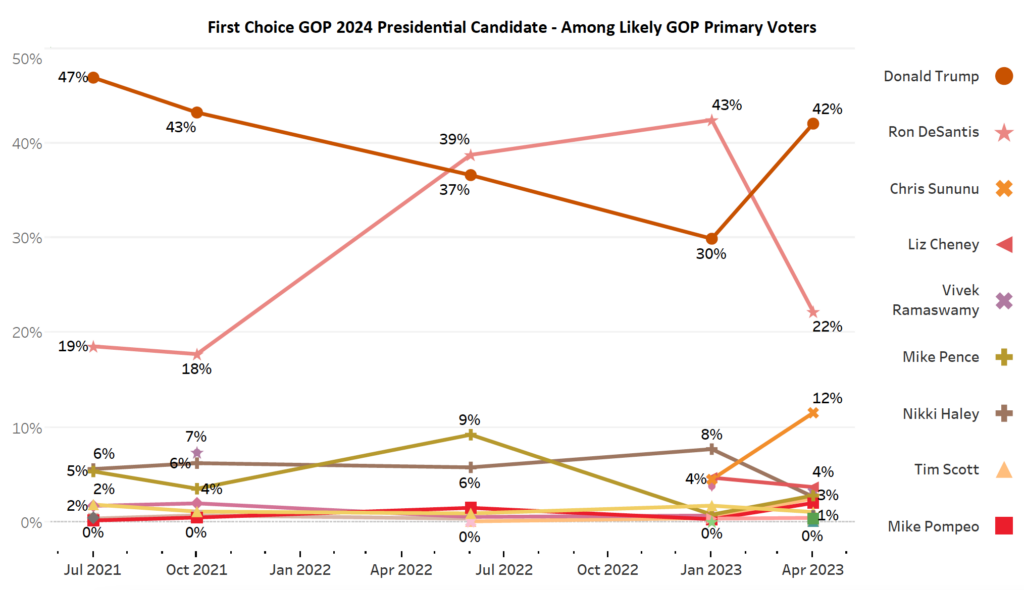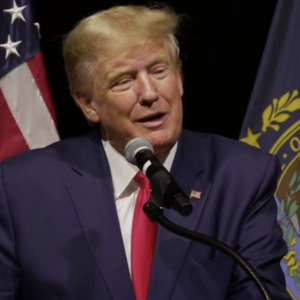Florida Gov. Ron DeSantis may have had a great night in Manchester last Friday, but the latest UNH poll numbers show it is former President Donald Trump who is surging among New Hampshire Republicans.
After more than a year of steady decline, the percentage of the state’s GOP backing Trump for the 2024 nomination has soared from 30 to 42 percent. At the same time, DeSantis’ support, which had been steadily rising since October 2021, plunged by 21 points, from 43 to 22 percent.
“Trump’s support has increased markedly among self-described libertarians (+48) and conservatives (+26) as well as among women (+23),” according to the press release detailing the results of the Granite State Poll, a States of Opinion Project, conducted by the University of New Hampshire Survey Center.

The Granite State Poll, a States of Opinion Project, conducted by the University of New Hampshire Survey Center.
The only other candidate to see major movement was Gov. Chris Sununu, from 4 percent to 12 percent since January, though entrepreneur Vivek Ramaswamy jumped from an asterisk to 3 percent over the same period.
The source of Trump’s surge is almost certainly the reaction to his indictment by progressive Manhattan District Attorney Alvin Bragg on a business paperwork filing case — a case even left-leaning media outlets like The Washington Post acknowledge is weak. A UNH survey released earlier this week found 86 percent of Granite State Republicans believe politics played a “major role” in that indictment.
For some New Hampshire Republicans, the numbers are the latest sign that the 2024 nomination is Trump’s to lose.
“Politics has become like a nature TV special: Trump is the tiger, and everyone else is the gazelle,” said GOP strategist Pat Griffin. “The laws of nature say kill or be killed. That’s how this GOP sees things.
“Trump is too strong to be stopped. And that’s exactly what the current Republican Party wants — at least for now.”
Veteran politico Tom Rath, a moderate Republican who publicly backed Joe Biden in 2020, sees the numbers differently.
“Trump’s lead is still there but not as solid as it has been,” he said. “He has a base, but it is not as large as it has been previously. Remember, he won the primary here in 2016 with 35 percent of the vote and has lost the state twice in the general election.”
If he can convince Granite State voters he is in it to win, Rath also sees potential for Sununu.
“I think if Sununu were to get in and demonstrated a genuine candidacy, his number would be higher,” Rath said. “But he has to show viability elsewhere in order to capitalize on his strength here. I think folks in New Hampshire would vote for him if they are convinced that his candidacy is real.”
Trump’s strength, in New Hampshire and with Republicans nationwide, in the wake of his indictment is undeniable. That is one reason some Republicans see the shaky legal case as a continuation of the Democrats’ 2022 strategy of helping Republicans whom they believe are weak candidates win their party’s nomination.
But Trump’s steady decline in the months leading up to the Manhattan arraignment could also be a sign that once the political sugar high passes, more voters may again be looking for another option. Note, for example, that DeSantis is the top second choice of these likely GOP primary voters (30 percent), with Trump at 14 and Sununu at 10 percent.
More significantly, DeSantis is the second choice of 56 percent of Trump voters. (Trump’s the second pick of 35 percent of DeSantis voters.) In other words, Trump voters have no problem with DeSantis — a very different dynamic than, say, Trump vs. Jeb Bush or John Kasich in 2016.
If DeSantis can stay in this spot — a viable “block Trump” vote among the former president’s opponents and an acceptable alternative to Trump among his fans — DeSantis would be in a strong position if Trump’s support softens again.
And Trump losing altitude is a very real possibility, not just because he spent most of 2022 on a downward trajectory. In this same UNH Survey that shows Trump leading DeSantis by 22 points, Republican primary voters are split on whether he should run at all.
“Just over half (51 percent) of likely New Hampshire Republican primary voters think Trump definitely (41 percent) or probably (11 percent) should run for president in 2024,” according to the UNH release. And 46 percent think he definitely (27 percent) or probably (19 percent) should not run.”
A 51 to 46 percent split is hardly overwhelming support from his own party and is a potential sign that the electability argument may be taking hold. Why else tell pollsters you want to vote for Trump, but you’re not sure he should run?
“New Hampshire moderates could be the decisive primary voting bloc,” notes UNH political science professor Dante Scala. “Would they abandon their favorite candidate (whoever that might be) and support DeSantis in order to defeat a candidate they despise?”
Andy Smith, Director of the UNH Survey Center, has this reminder. “Voters have not made up their minds about who they will eventually vote for. Past research has indicated that approximately half of voters have not made up their minds as late as a week before the election.”





